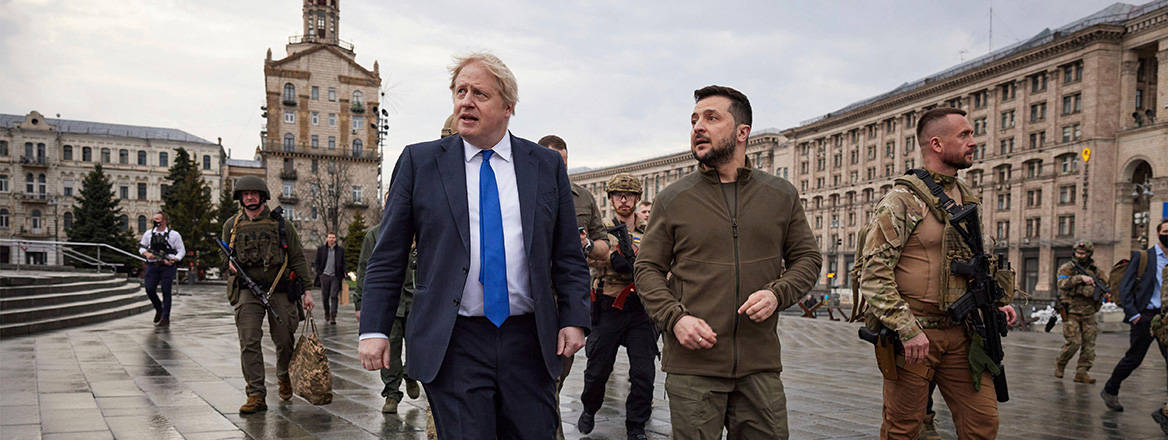Is the UK Making Itself a Target for Russian Retaliation?
Moscow will be irritated by the stridency of UK’s support for Ukraine and might contemplate singling it out for specific action. How prepared are Whitehall and the public for retaliation, and how would allies react?
The UK has had a pretty ‘good war’ so far. The British intelligence community, along with the Americans, clearly predicted the invasion – in stark contrast to the French, whose military intelligence chief, General Eric Vidaud, has been sacked for providing ‘inadequate briefings’ and a ‘lack of mastery of subjects’.
Richard Moore, the MI6 Chief, tweeted on 24 February: ‘Slava Ukraina! US and UK intelligence communities uncovered Putin’s plans for Ukraine. We exposed his attempts to engineer ‘false flag’, fake attacks to justify his invasion’. The UK has been smart in how it has deployed intelligence to send messages both to NATO partners and to Putin himself. Contrary to various press reports, there is nothing particularly new in using intelligence to alert allies and warn antagonists but it has been notably prolific and we can be sure that no sources or methods have been compromised.
The Ministry of Defence under Ben Wallace has also had a ‘good war’. It supplied the Anglo-Swedish NLAW anti-tank missiles at an early stage and has supplemented them throughout the conflict while adding the Starstreak anti-aircraft system. Furthermore, both weapons have proved very effective (in contrast to the Blowpipe missiles sent to the Afghan Mujahideen in the 1980s).
The Ukrainians have been pleased with British assistance and have used it to criticise Germany and France’s more sluggish military support. In fact, the UK has been helping Ukraine’s armed forces since the 2014 annexation of Crimea and had agreed a major arms sale in 2021, well before the invasion. There have been numerous reports of British training of Ukrainian forces right up to the invasion itself and it is likely that intelligence and operational advice continues to flow from London to Kyiv.
The UK is potentially more vulnerable because it neither has the military heft of the US nor the safety in numbers which comes with EU membership
The visit of Boris Johnson to Kyiv was testament to those close relations as well as a perfect opportunity for political theatre, which will have caused almost as much irritation in Paris as in Moscow.
All of this will be watched closely in Moscow. Relations between Russia and the UK are by far the worst of all NATO’s 30 members. The killing of Alexander Litvinienko in 2006 was a watershed moment in the relationship and was followed by several other mysterious deaths and most recently the attempted murder of Sergei Skripal in Salisbury in 2018. The UK’s subsequent successful coordination of the international expulsion of over 100 Russian intelligence officers (including 60 from the US, 23 from UK and 4 each from France and Germany and even one from Hungary) further infuriated Moscow.
Furthermore, the ending of London’s status as a ‘safe space’ for Russian oligarch money may have removed one of the few remaining constraints on Putin taking retaliatory action. The UK is also potentially more vulnerable because it neither has the military heft of the US nor the safety in numbers which comes with EU membership. Nonetheless, the UK is covered by NATO’s Article 5 and so Russia will know it needs to be careful. Any action would have to be ‘plausibly deniable’, but that does not mean that it would be inconsequential. Far from it – Russia’s deniable operations are often intended to send a message. The Skripal operation was so transparent that it was dubbed ‘implausibly deniable’.
What might Moscow do? A cyber attack against part of the UK’s critical national infrastructure (such as the power grid or a bank) would be one option. Russia has powerful cyber capabilities available and is the prime suspect behind the massive ‘SolarWinds’ attack against the US in late 2020. Cutting a particular underwater cable of importance to the UK economy could be another. The shooting down of an RAF aircraft (allegedly mistaken for a Ukrainian plane) on the edge of Ukrainian air space might be a third. Doubtless Moscow could dream up a range of other harmful measures, confident in their skill at post-facto denial and obfuscation which we observed after the Malaysian Airlines Flight 17 shoot-down in 2014.
The UK should not reduce its important and effective support for Ukraine, but should resist high-profile opportunities to goad Putin and be more discreet about arms deliveries
The fundamental difficulty which the UK would face after such an incident would be 100% definite attribution. The problem with NATO Article 5 is that it would take all 30 members much closer to all-out war with Russia and the consequent risk of nuclear use. So, all members would express suitable concern and would support an immediate and thorough investigation into the circumstances, but would be wary of taking any form of kinetic action. Russia would lie, obfuscate and allege provocation. Some EU allies would privately think that the UK had brought its problems on itself.
This is not an argument for reducing the UK’s important and effective support for Ukraine but for resisting high-profile opportunities to goad Putin and to be more discreet about arms deliveries. Whitehall should also consider toning down some of the more bellicose rhetoric as well as criticism of allies’ relative passivity. In a world of fewer and fewer secrets, the benefits of discretion are still compelling.
The views expressed in this Commentary are the author’s, and do not represent those of RUSI or any other institution.
Have an idea for a Commentary you’d like to write for us? Send a short pitch to commentaries@rusi.org and we’ll get back to you if it fits into our research interests. Full guidelines for contributors can be found here.
WRITTEN BY
Tim Willasey-Wilsey CMG
RUSI Senior Associate Fellow, RUSI International
- Jim McLeanMedia Relations Manager+44 (0)7917 373 069JimMc@rusi.org


